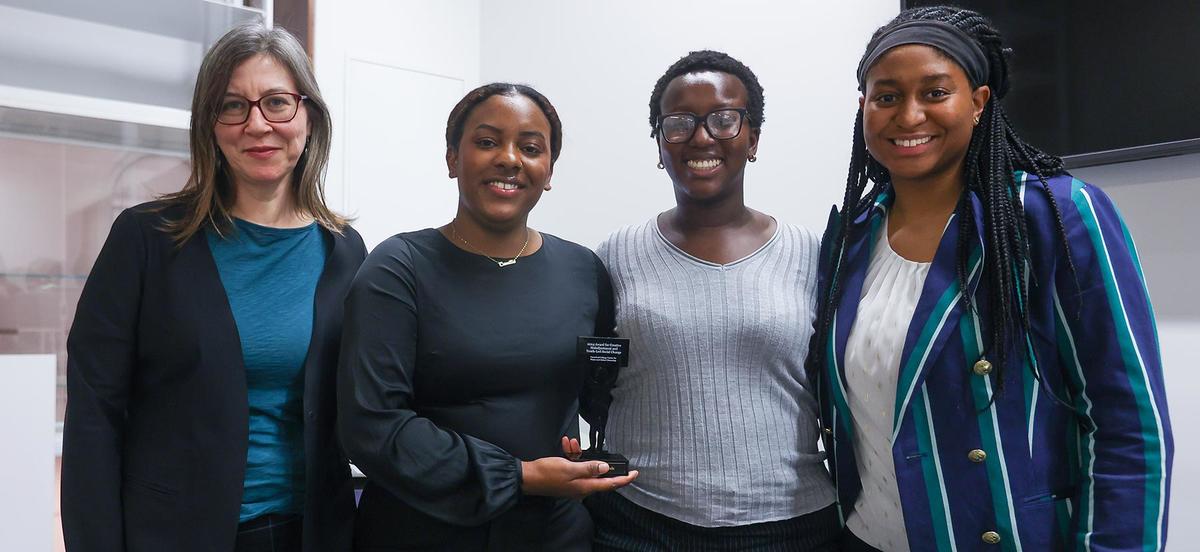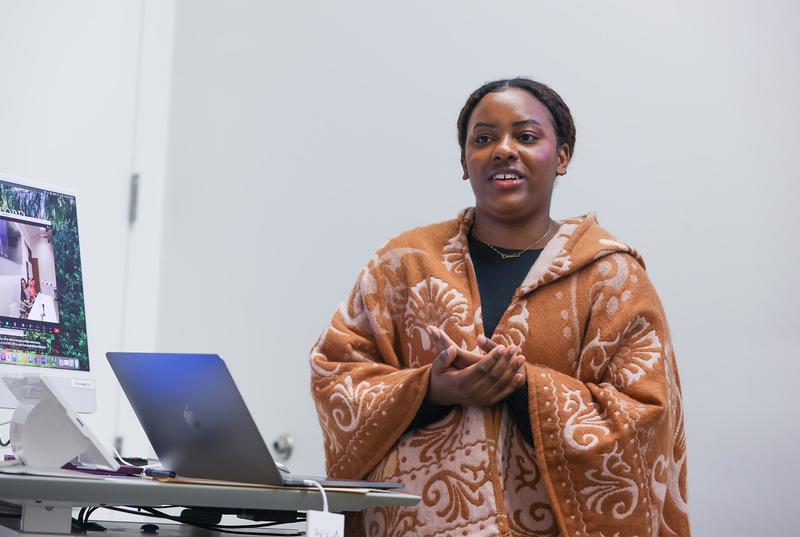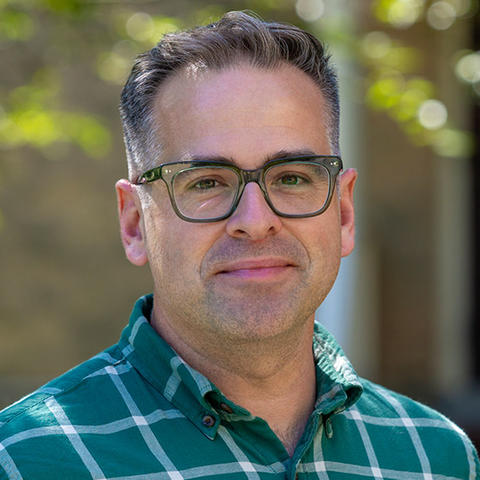Camille Samuels '21 Receives Second Annual Creative Maladjustment and Youth-Led Social Change Award

Pictured, from left, are Janice Lion, associate director of the Center for Peace and Global Citizenship; Camille Samuels '21; Pendo Kamau '24; and Diamond Howell-Shields, director of the Office of Race and Ethnicity Education. Photos by Paola Nogueras.
Details
Samuels, who is now pursuing her PhD at University of California Irvine, focuses her research on Black-led food justice and sovereignty.
When she returned to Haverford last Thursday, it was just the third time that Camille Samuels set foot on campus since the onset of COVID-19. A member of the class of 2021, she made the cross-country trip from Los Angeles to receive the second annual Creative Maladjustment and Youth-Led Social Change Award award from the Center for Peace and Global Citizenship. The award recognizes emerging leaders who advance peace, justice, inclusion, or sustainability aligned with Martin Luther King Jr.’s enduring call for resistance to injustice.
The pandemic and the periods of isolation it fostered proved to be a profound catalyst for Samuels. While learning from a distance at her family’s home in the Washington, D.C. metropolitan area during her junior year, she turned to a backyard garden to occupy her free time, connecting with a pastime she long shied from and uncovering a passion that was kindled at Haverford.
“In graduate school, in life or work, or whatever the case is, I’ve been learning the value of a Haverford education over the past few years,” Samuels, who designed her own health, science, and societies major, says. “As cliche as it sounds, I have come to appreciate the style of education we received, the community that I was part of, and the opportunities I was exposed to.”
As a Black woman just three generations removed from ancestors who migrated north to escape the American South’s cruel agricultural legacy, Samuels says that gardening and its ability to create community was the furthest thing from her mind. It wasn’t until her sophomore year at Haverford that she encountered a Black-led farm and outdoor space for the first time. She says it was on a class trip to North Philadelphia’s Life Do Grow Farm that she realized the power gardening and agriculture can wield in fostering community and what her post-College life could entail.
“That was really impactful because it was the first time I questioned why my knee-jerk reaction was that [agriculture] has nothing to do with me when it absolutely does,” Samuels recalls. “It’s a big portion of what I eat every day. It comes from someone’s hands.”
Later, on the cusp of COVID restrictions and stay-at-home orders, Samuels traveled to Trinidad and Tobago over spring break 2020 with Associate Professor of Environmental Studies Jonathan Wilson, CPGC International Programs Manager Stephanie Zukerman, and classmates enrolled in his advanced environmental studies class “Economic Botany,” where they focused on the co-evolution of plants and human beings. Every day on their trip, they engaged with the Caribbean country’s ecosystem and the people who steward it. They arrived back in the U.S. after scores of flights from Europe were grounded, traveling back to a closed campus on a mostly deserted New Jersey Turnpike, Wilson recalls.
“I think that trip clearly had an impact on Camille,” Wilson says. “She has an omnivorous curiosity, just wanting to learn, wanting to know more, and wanting to apply it.”

Samuels, who is now firmly rooted in California and pursuing her PhD in cultural anthropology at University of California, Irvine, agrees. While in Trinidad and Tobago, she says, seeing Black people enmeshed in nature in their daily lives was a turning point for her. Informed by class experiences and a period of reflection prompted by the pandemic, she has since engaged in research surrounding Black-led food justice aimed at ending food apartheid in Black and marginalized communities. That term, coined by activist Karen Washington, is a more accurate descriptor than the more widely recognized food desert to highlight inequitable access to nutrition, Samuels says.
“It’s not only about food access but also cultural competency in food spaces, too. So, not only might you not have access to anything, but what you do have access to you might not know how or want to cook,” Samuels explains. “It’s a more holistic, more structural view on what shapes food access in communities that are under-resourced.”
Pendo Kamau ’24, nominated Samuels for the award due to her “deep love for meaningful, sustainable relationships to land and community.” Kamau notes, “in her academic and personal ventures, she invests herself in communities and institutions that are pushing for more equitable relationships to the environment and food.”
An overarching concern for community and holistic social and ecological health was evident in Samuels’ presentation and facilitation Thursday evening. She invited mentors, collaborators, and emerging leaders from around the Philadelphia region, all of whom advance Black-led food justice and sovereignty. They included Elizabeth Okero, Life Do Grown Farm’s co-director, Hannah Thompson of Philadelphia’s seed-saving initiative, True Love Seeds, and Casandra Brown, manager of the Haverfarm. The award presentation was preceded by an informal dinner featuring African American New Year’s dishes organized by Samuels in the VCAM kitchen, where she provided current students with insight into post-graduation life.
“Attention to relationships and local leadership coupled with bold visions for meaningful structural change leading to a more just, healthy, and thriving world is at the core of Camille’s work,” remarks CPGC Executive Director Eric Hartman. “It’s clear that, like MLK, Camille also leads from a place deeply grounded in values of justice, refusing to settle for the world as it is, building toward better futures, and in a manner that amplifies the dignity of all involved and affected.”




